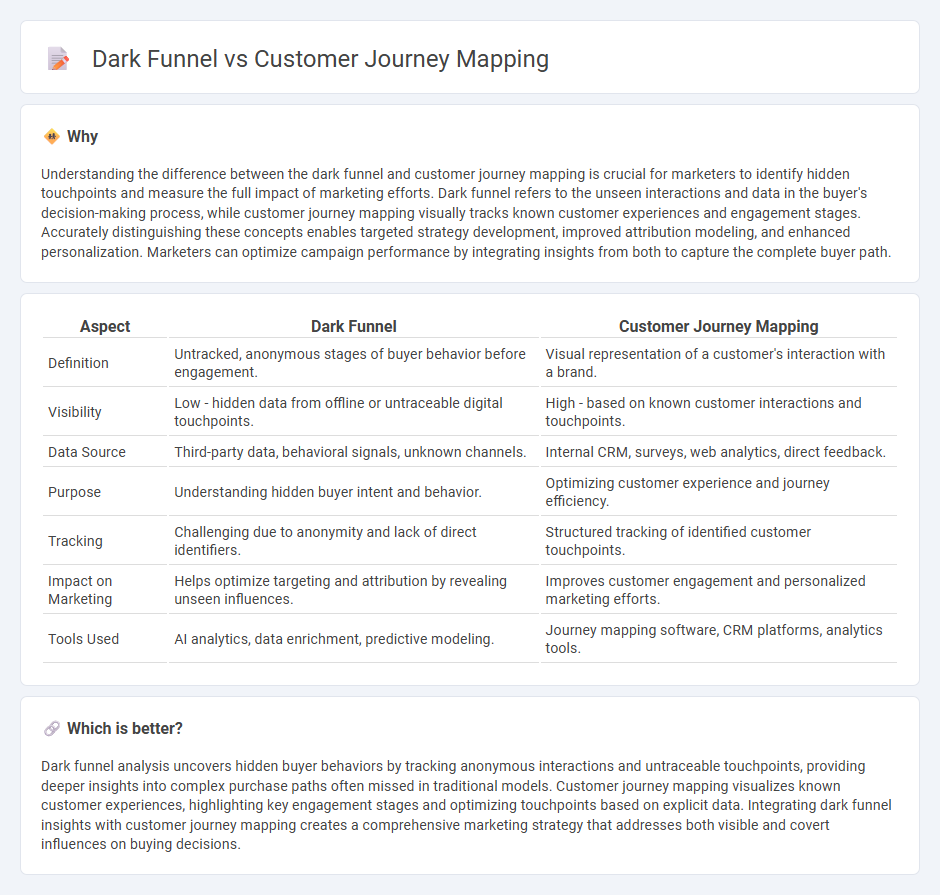
Dark funnel marketing captures unseen interactions and anonymous data points that influence consumer decisions before they enter the traditional sales funnel, revealing hidden touchpoints and engagement patterns. Customer journey mapping visually outlines the explicit steps and emotional experiences consumers undergo from awareness to purchase, focusing on tracking and optimizing known interactions. Explore the nuanced differences between dark funnel strategies and customer journey mapping to enhance your marketing effectiveness.
Why it is important
Understanding the difference between the dark funnel and customer journey mapping is crucial for marketers to identify hidden touchpoints and measure the full impact of marketing efforts. Dark funnel refers to the unseen interactions and data in the buyer's decision-making process, while customer journey mapping visually tracks known customer experiences and engagement stages. Accurately distinguishing these concepts enables targeted strategy development, improved attribution modeling, and enhanced personalization. Marketers can optimize campaign performance by integrating insights from both to capture the complete buyer path.
Comparison Table
| Aspect | Dark Funnel | Customer Journey Mapping |
|---|---|---|
| Definition | Untracked, anonymous stages of buyer behavior before engagement. | Visual representation of a customer's interaction with a brand. |
| Visibility | Low - hidden data from offline or untraceable digital touchpoints. | High - based on known customer interactions and touchpoints. |
| Data Source | Third-party data, behavioral signals, unknown channels. | Internal CRM, surveys, web analytics, direct feedback. |
| Purpose | Understanding hidden buyer intent and behavior. | Optimizing customer experience and journey efficiency. |
| Tracking | Challenging due to anonymity and lack of direct identifiers. | Structured tracking of identified customer touchpoints. |
| Impact on Marketing | Helps optimize targeting and attribution by revealing unseen influences. | Improves customer engagement and personalized marketing efforts. |
| Tools Used | AI analytics, data enrichment, predictive modeling. | Journey mapping software, CRM platforms, analytics tools. |
Which is better?
Dark funnel analysis uncovers hidden buyer behaviors by tracking anonymous interactions and untraceable touchpoints, providing deeper insights into complex purchase paths often missed in traditional models. Customer journey mapping visualizes known customer experiences, highlighting key engagement stages and optimizing touchpoints based on explicit data. Integrating dark funnel insights with customer journey mapping creates a comprehensive marketing strategy that addresses both visible and covert influences on buying decisions.
Connection
Dark funnel analytics reveal hidden customer interactions that traditional tracking misses, enriching customer journey mapping with deeper behavioral insights. Integrating dark funnel data allows marketers to identify untracked touchpoints, optimizing conversion paths and marketing strategies. This connection enhances targeting precision by uncovering subconscious influences within the buyer's decision-making process.
Key Terms
**Customer Journey Mapping:**
Customer Journey Mapping systematically visualizes every interaction a customer has with a brand across multiple touchpoints, enabling businesses to identify pain points and optimize the overall experience. It leverages data from CRM systems, user behavior analytics, and feedback loops to create a comprehensive representation of customer motivations and decision-making processes. Explore how advanced Customer Journey Mapping can enhance customer retention and drive revenue growth.
Touchpoints
Customer journey mapping visualizes every touchpoint a customer interacts with, offering a transparent view of their path from awareness to purchase, while the dark funnel highlights the hidden, untracked touchpoints that influence decisions outside of measurable channels. Identifying both explicit and implicit touchpoints enables marketers to optimize engagement strategies and bridge gaps between visible data and unseen influences. Explore how integrating insights from the dark funnel enhances the accuracy of your customer journey mapping for superior marketing outcomes.
Personas
Customer journey mapping visualizes each touchpoint a persona encounters during their buying process, providing clear insights into customer behavior and decision-making stages. The dark funnel represents the hidden, untracked interactions and influences, often digital, that impact personas but evade traditional analytics or attribution models. Discover how understanding both concepts enhances targeted marketing strategies and drives more effective persona engagement.
Source and External Links
The customer journey map and why it's important - A customer journey map is a visual representation of all the contact points between a customer and a company throughout their relationship, designed to understand experiences and identify improvement opportunities by setting goals, creating personas, and mapping touchpoints.
What is a Customer Journey Map? - This map visualizes every customer experience with a brand, highlighting personas, key stages, touchpoints, emotions, and pain points to accurately reflect and improve customer experiences.
30 Best Customer Journey Mapping Tools of 2025 - Customer journey maps can be created using various tools and approaches, from freeform drawings to digital software, emphasizing tracking discovery, purchase, use, feedback, and churn to improve engagement and retention.
 dowidth.com
dowidth.com